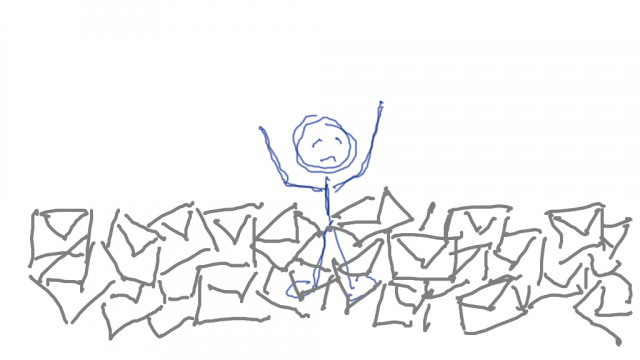
It’s time to switch off the life support for email
I’ve previously argued that we should abandon email as soon as possible because email overload is causing the raising of serious communication barriers.
In an article in The Conversation, academics Tom Jackson and Emma Russell reveal that while the number of emails being sent has started to sharply decline, 87% of employees suffer email overload, with 53% of them reporting that they are unable to cope with the volume of email they have to try to manage.
Jackson and Russell investigate if three new email systems – IBM’s Verse, Amazon’s WorkMail, and Google’s Inbox – might offer some hope in addressing four fundamental issues that they identify as contributing to email overload at work:
- We’re addicted to email, with one in three people responding to email within seconds.
- We’re poor at managing our inbox, so we fail to cope with the information it contains.
- We don’t write email in succinct, understandable language, adding unnecessary complexity.
- We find it difficult to switch off, with smartphones allowing us to access work email 24-hours a day, meaning there’s no respite from daily work stresses.
They find that Verse improves co-working, so it goes some way towards assisting with email management. Google Inbox addresses two of the four fundamental issues – inbox management and difficulty in switching off – but WorkMail fails to deal with any of them.
So, despite the efforts of three of the world’s major technology companies – IBM, Amazon, and Google – two of the four fundamental problems with email overload remain unaddressed.
I consider this further evidence in support of my argument that trying to solve email overload is an exercise in futility, and that the real solution is to abandon email altogether as soon as possible.
As I discuss in another article, the solution isn’t social media. David Glance, Director of the Centre for Software Practice at the University of Western Australia, provides support for this view. He states in The Conversation that while social media is far from being on life support, it “has lost its youthful promise and is looking old, tired and grumpy.”
It’s time to turn off the life support for email, step over social media, and embrace the messaging revolution.
Messaging too will probably have its day and then fade, although that is some way off. The rising popularity of voice messages with messaging app users suggests that the next communication revolution could be something remarkable that I’ll call “conversation”…
Image source: Drowning in email by Xavier Vergés is licenced by CC BY 2.0.
Also published on Medium.







Interesting.
But is email the cause or the symptom?
I’m reading this in December of 2021 and absolutely believe this is still relevant & is a valid argument to be made.